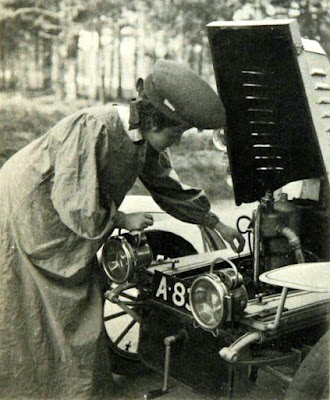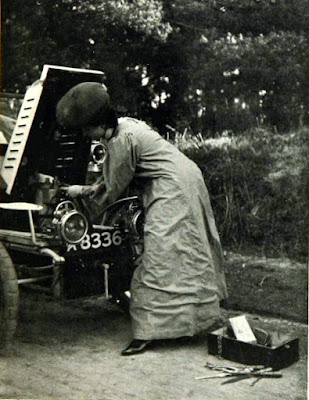 you learn to drive a car? A guide especially written for women drivers as though they know very little about a car? A guide that explains the details of caring for a car? I was delighted to find this little gem of a book,
The Woman and the Car: A Chatty Little Handbook for All Women Who Motor or Who Want to Motor, and to learn how simple the care of a car was in 1909. Both of my grandmothers, one born in 1888, the other in 1893, would have
been of an age to use this book when learning to drive. It may seem
quaint to us in our day and age but I'm certain that the avant garde women of 1909 would have been pleased to have had this guide to motoring, as the author called it.
you learn to drive a car? A guide especially written for women drivers as though they know very little about a car? A guide that explains the details of caring for a car? I was delighted to find this little gem of a book,
The Woman and the Car: A Chatty Little Handbook for All Women Who Motor or Who Want to Motor, and to learn how simple the care of a car was in 1909. Both of my grandmothers, one born in 1888, the other in 1893, would have
been of an age to use this book when learning to drive. It may seem
quaint to us in our day and age but I'm certain that the avant garde women of 1909 would have been pleased to have had this guide to motoring, as the author called it.Today, June 24, is International Women Drivers' Day. Is anyone else celebrating with me? My maternal grandmother, Emma Bickerstaff Meinzen, never drove a car and as far as I know, neither did any of my great-grandmothers. (Though I know at least one of my great-grandmothers drove a horse and cart, and probably several others did, too.) Of my direct-line female ancestors, only my mother was a driver of an automobile.
The contents page tells us that it covers cost, upkeep, and accessories; dress for driving; the mechanism of the car; how to drive; how to avoid troubles and mend them; hints on expenses; motor manners; tips for the necessary and the unnecessary, and several other categories.
Here are a few photos from the book.
 |
| The Useful Overall |
 |
| Changing the Oil |
 |
| Changing the spark plug |
 |
| Almost flooding the carburetor so it will start easily |
She makes the upkeep of a car seem simple. (But then maybe cars were simpler in 1909.) I've never changed a spark plug nor the oil in a car. She didn't mention dirty, greasy hands though the overall suggested the possibility of getting dirty.
I found the section on motor manners interesting. As you can probably guess from the paragraphs below, the author was British so manners in Britain might have been a bit different than in the U.S. Her instruction of care when driving past a horse reminds me that 1909 was a time when the roads were shared with pedestrians, horses, horses and buggies/carts, and cars. A transition time. And how I wish modern drivers were more careful about not splashing pedestrians when there are puddles of water.
The author included a dictionary, especially helpful when the technology is new. There are car parts that I've never heard of, car parts that now have different names, and maybe some car parts that cars no longer have. The definitions of these words were ones I found interesting: Bevel Gear, Big End, Cam, Change-Speed Gear, Governor, Induction Coil, Pony-Brake, and Sparking-Plug.
All in all, I found the book insightful into the social history surrounding the advent of cars. Not only did I learn about driving in a car, I also learned about those who were not in cars.
The author of The Woman and the Car is Dorothy Levitt. You can read more about her and read her book at this post in The Public Domain Review. (It's an excellent article so be sure you visit.) You can also read or browse the book at Internet Archive.
Did any of your grandmothers who lived in the first quarter or half of the 20th century drive a car? Did they tell you of their experiences?
Happy International Women Drivers' Day!
-–Nancy.
Copyright © 2022 Nancy Messier. All Rights Reserved.
Do not copy or use any content from this blog without written permission from the owner.
.






Dear Nancy - I just loved this blog post. I had no idea there was such a thing as International Women's Drivers Day. I loved the photos and the Handbook extracts. What a find! To the best of my knowledge my grandmothers did not drive and indeed not all mothers that I knew drove. I remember my mother telling her best friend who didn't learn to drive until she was in her 30s, to chew gum while she learned. Apparently that's what got my mother through the early years of learning to drive :)
ReplyDeleteI'm so glad you enjoyed it, Alex. This was a new commemorative day to me, too. I learned of it just after I saw the book and thought they went well together.
DeleteI don't know when you mom was born to now the year she might have begun driving but some of my friends' moms did not drive when I was a child in the '50s, though my mom's three sisters all learned to drive. Hey, chewing gum sounds like a good idea to me--we don't have to consciously think about it yet it gives our bodies somewhere for the nervous energy to go.
I had never heard of this day. The book excerpts and photos were fun. Neither of my grandmothers learned to drive a car and I’m pretty sure their mothers didn’t either.
ReplyDeleteThanks for visiting and leaving a comment, Kathy. I'm glad you enjoy the photos and excerpts. I think many fewer women learned to drive in the early decades of the 1900s than those who didn't. Maybe women weren't as adventurous then?
Delete